With just 4 tables and 1 cook, small-town Missouri restaurant serves up gourmet magic
A blur of movement in the back of the room, Nick Martinkovic is the only cook in the kitchen.
It is a space built for one, a tidy cubby of induction burners and lowboy refrigerators, pots, pans, a conduction oven and a few feet of counter space. Alone inside this fort, Martinkovic moves with militaristic discipline for hours on end, churning out about 100 dishes every Thursday, Friday and Saturday night for customers at Noah’s Cupboard, a sliver of a restaurant in this Rockwellian downtown 30 miles northwest of Kansas City.
They’re not dining on chicken tenders or macaroni and cheese. Martinkovic’s menu on a recent Thursday featured a red beet salad tossed with ricotta cheese, kohlrabi, strawberries and avocado; duck confit sauced with Vietnamese nuoc cham; and a beef short rib served on chermoula alongside shrimp scampi and local broccoli.
It makes for one of the most unique restaurant experiences in the metro at the moment: one cook, four tables, farm-to-table fine dining in a 400-square-foot space that melts the walls between chef and guest.
“I like that it takes a little while after walking in before you can figure out what’s going on here,” Martinkovic said, cleaning his station after a busy dinner rush. “But by the end of the meal, I think most people realize, ‘Oh, all the food I just ate was made by that one person in that one little space in the back. He’s basically here in the dining room with us.’”
It is not totally a one-man show. The restaurant also employs a dishwasher, an expediter/runner and a server, the latter role most often filled by Martinkovic’s wife, Andrea, with whom he opened Noah’s Cupboard in 2018.
Their ambitions were initially much larger in scale.
“We were looking at massive, million-dollar projects in the Crossroads, the West Bottoms, the Northland,” Andrea said. “But the universe just kind of pushed us to Weston.”
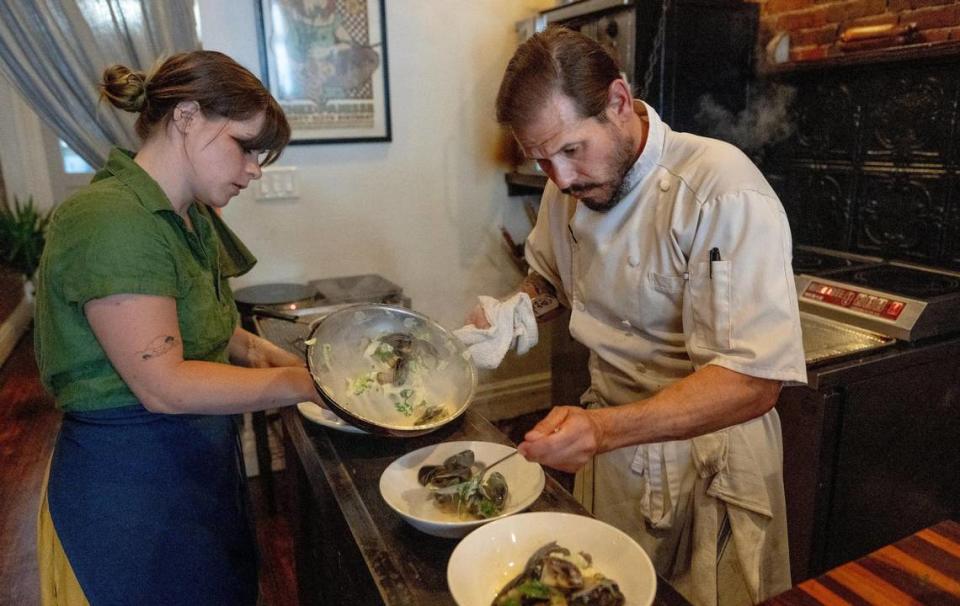
Why Weston, Missouri?
Martinkovic, 43, was raised in upstate New York, started cooking when he was 16, went to culinary school and worked in kitchens all across the country. “Maine, Massachusetts, a bit in New York, Florida, Colorado, Atlanta, I spent some time in Europe,” he said. “Three years, and I would start to get itchy.”
His resume includes a run as sous chef at Roberta’s, the world-famous Brooklyn pizzeria, and, later, executive chef stints at the St. Louis eateries Blood and Sand and Death in the Afternoon. Through an employee in St. Louis, Nick met Andrea, who had a hospitality background and was then living in Kansas City and working as a health coach and yoga instructor.
She had grown up in Weston but had no desire to go back and live there. Nick was more taken by the small-town charm.
“We’d come to have dinner with Andrea’s parents and drive over the hills up here, and it always reminded me of country roads in Europe, like Wales or England,” Nick said. “It felt like a nice pocket of the world to me. The cops wave at you, the kids play outside. I’d say to Andrea, ‘We could live here someday.’ And she’d say: ‘Bull----.’”
After dating long-distance for a few years, they got engaged. A month before their wedding, in 2017, they were supposed to move into a house in Prairie Village. But it fell through at the last minute. They ended up moving in with Andrea’s parents in Weston.
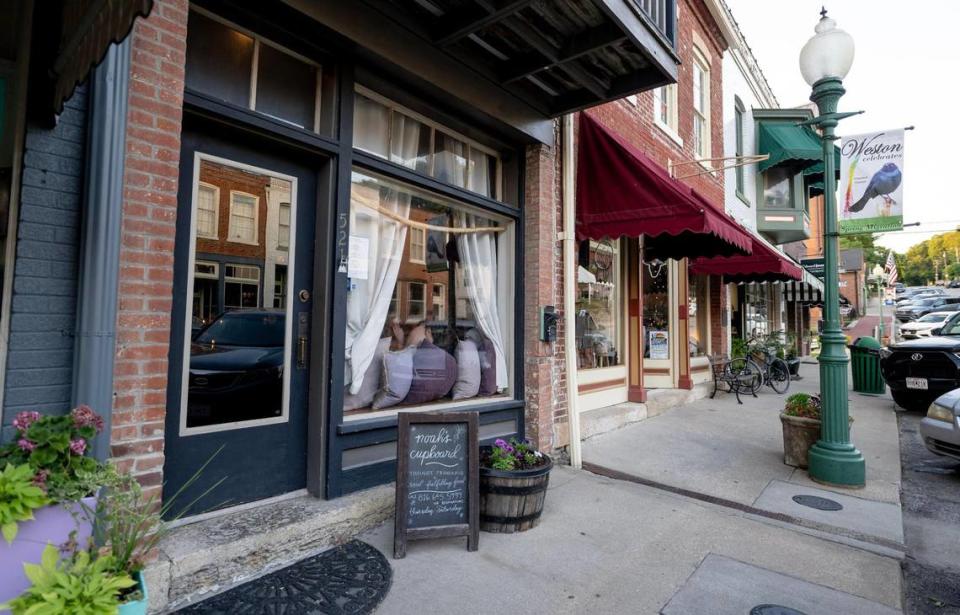
“The plan was just to stay for a short time — to get past the wedding, do our honeymoon, and figure out what we wanted to do about opening a restaurant,” Andrea said. “Then we came across this place downtown on Craigslist.”
It was a narrow space, a walled-in alley with original, late-1800s bricks bracketing the room. It had previously been a soap shop. There was no hood, no gas. Nothing about the place suggested a venue suited to Martinkovic’s culinary ambitions.
“I walked in and said, ‘This can’t be a restaurant,’” Martinkovic said. “But we were chomping at the bit to open something.”
“I was like, we could do this in our sleep, let’s just jump in with two feet, it will be easy,” Andrea said. “We told the owner we were interested in putting a restaurant in there. He goes, ‘Rent’s $650 a month, plus I need a deposit, here’s the keys.’ He even helped us build the bar and some tables with wood from his property.”
They opened Noah’s Cupboard — it is named after their son — in 2018 for just $15,000, “which is, like, unheard of,” Martinkovic said. They saw a profit quickly.
“A lot of people build their dream restaurant and spend years paying it off before they get anything back on it,” Martinkovic said. “In a place like Weston, you don’t necessarily have to do that. The rent is cheap enough that we don’t have to work 12 or 14 hours every day like I’d been doing most of my life before this. We can do other things.”
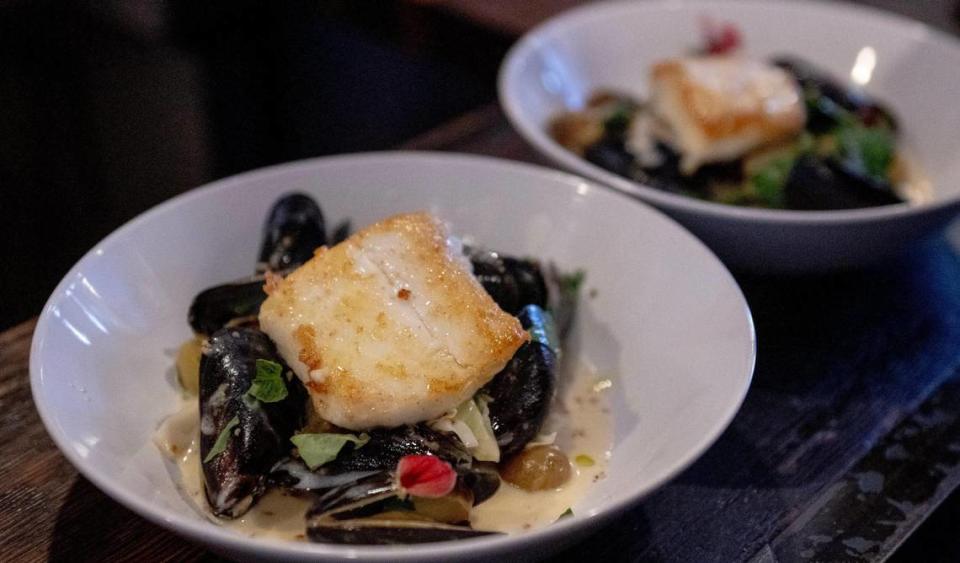
Creating the menu
Operating a gourmet restaurant in such a tiny room in a tiny town — population: less than 2,000 — presents other challenges, though. To make the math work and preserve their sanity, the couple had to refine their vision.
It remains an ambitiously local endeavor, fixated on sustainable practices. They source from local farms: Crum’s Heirlooms in Bonner Springs, Pearl Family Farm in Parkville, Green Grass Cattle in Weston, Bush Family Farms in Warrensburg. They stock up on garlic, squashes and potatoes from nearby farms toward the end of the season and store them in a root cellar beneath the restaurant’s steps. They pickle vegetables that would otherwise go to waste. They turn carrot and turnip tops into pestos and chimichurri. And they buy parts like pig heads and beef tongues from farmers who otherwise have a hard time selling them.
“That’s how a lot of our relationships with farmers started,” Martinkovic said. “Most farmers just chop off a pig’s head and throw it in the garbage. So we say, ‘We’ll take that next head.’ That way, not only is it not wasted, but we’re paying the farmer for it.”
The menu, which changes weekly while in season, isn’t as scary as that might sound to conservative eaters. Even a picky child would struggle to argue with the uncommonly flavorful Caesar salad, a blizzard of Parmigiano Reggiano dusted atop red leaf lettuce, anchovies, lemon and gremolata breadcrumbs.

“The Caesar is always on the menu,” Martinkovic said. “If there’s a Caesar and a beef entree on the menu, that’s enough to make most people feel comfortable.”
The original menu was much larger: six salads and starters, three pastas, four entrees. It’s about half that now, with an emphasis on the $99 four-course prix fixe, which was originally only $40.
“I would have been out of business in two months,” Martinkovic said. “We thought we were opening a neighborhood restaurant, not too fancy, where we’d turn tables quickly. We used to take walk-ins, sit people at the counter. And we gradually realized we had to slow things down and make ourselves a destination.” The restaurant is now open just three nights a week, and reservations are required.
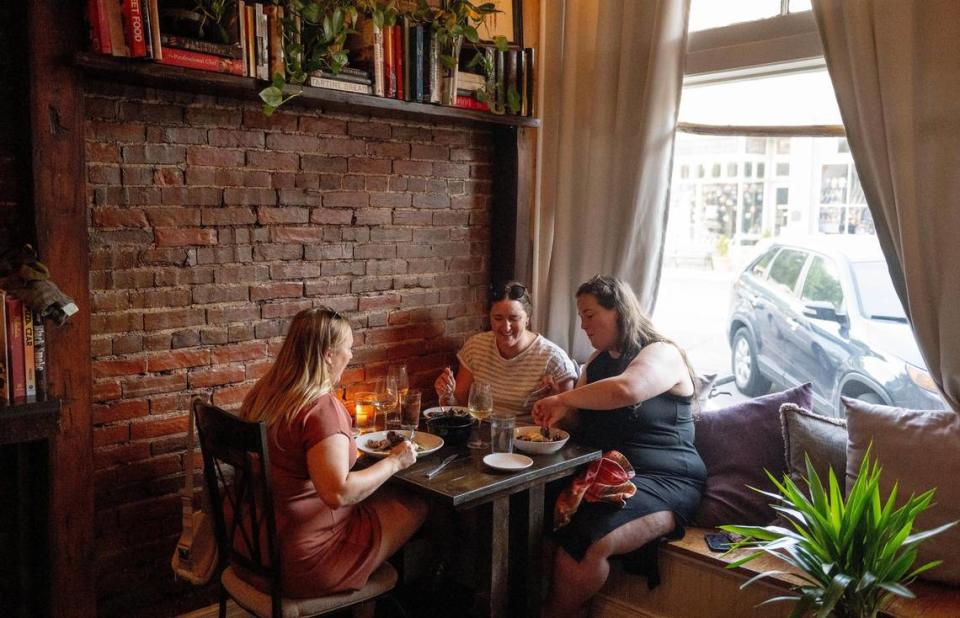
Will Noah’s Cupboard expand?
A turning point, the couple said, came four years ago when they hired Molly Diven, whom they’d met at Green Dirt Farm in Weston, where she was working as a shepherd.
“It’s rare to go to a restaurant where the chef makes and touches every component of what you’re consuming,” Diven said. “It’s inspiring to be a part of that, working with someone like Nick, who has such a high level of experience and knowledge and an almost extrasensory understanding of flavors.”
Like many things about Noah’s Cupboard, Diven’s role defies easy categorization; it is a position that would probably not exist in a normal restaurant. As the tickets roll in, she rides a line between front and back of house, plating panna cotta at the pass, dashing off to a table for wine service, returning to garnish a pierogi dish with bachelor’s button flowers.
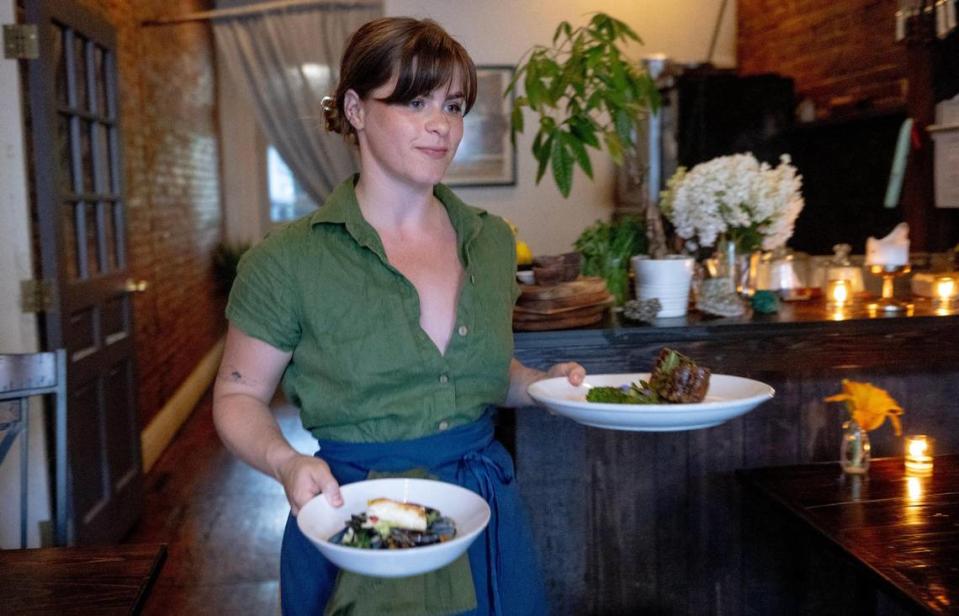
“There’ve been some nights at Noah’s where if you saw me in the kitchen, I would just look absolutely nuts,” Martinkovic said. “I get thrown into a vortex and it’s hard to get out sometimes. But having Molly help — it sounds super cheesy, but when we are in sync and really going, it feels like a ballet performance.”
The typical customer has changed too. Word has been getting out, despite the fact that Noah’s Cupboard has little in the way of a social media presence. Pre-pandemic, it was “a lot of repeats — people that we know,” Andrea said. These days, it’s mostly first-timers from Kansas City and foodie travelers staying at local bed and breakfasts. The James Beard Foundation has yet to come knocking, but it seems only a matter of time.
“I think if we had a full kitchen, the awards and recognition would be there,” Andrea said. “What you see at Noah’s is a limited range of Nick’s abilities.”
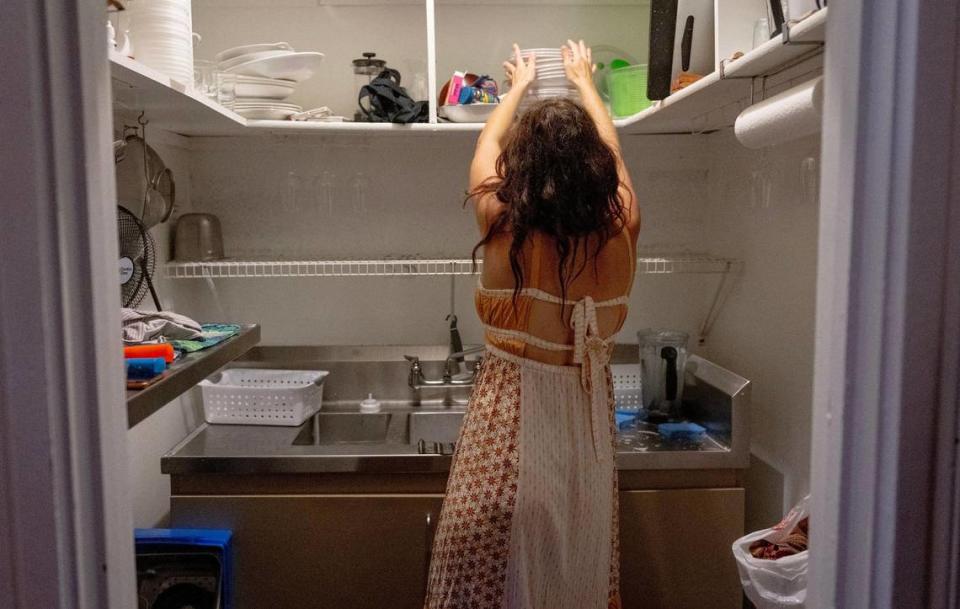
Diners may soon get the opportunity to experience that. They’re looking for a bigger space. They’d like to stay in Weston, where they now live with two kids in a house near downtown, but there’s not a lot of available inventory. Somewhere in the Northland is more likely.
Martinkovic said he’s conflicted.
“If it was 10 years from now, and I felt super secure and was ready to just work when I wanted, this current situation would be perfect,” he said. “But we are kind of boxed in here, and there are things I can’t do that I want to try. At the same time, I know a lot of chefs who did something beautiful, kind of like what we have here, and then chose something bigger over it, and they all seem to regret it.”
Alas: Change is inevitable and nothing gold can stay. Make your reservations now. The new spot, wherever it ends up, might be better. But it won’t be the same.

